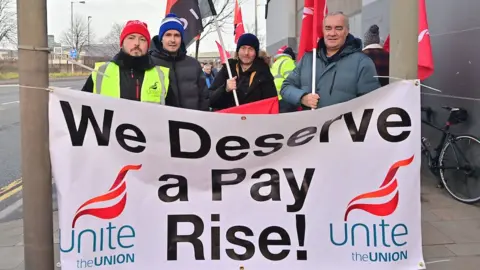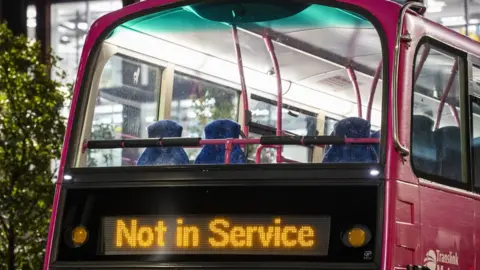Cost of Thursday 18 January strike estimated at £10m
 Pacemaker
PacemakerUnions from across the public sector are taking strike action next Thursday which will impact healthcare, education and public transport among other services.
Tens of thousands of workers will not be in work, so what impact will this have on the Northern Ireland economy?
One economist estimates losses of more than £10m.
Dr Esmond Birnie said December's transport strikes cost businesses several million pounds each day.
However, the senior economist at Ulster University's Business School said the impact of that disruption was much more acutely felt by two sectors, retail and hospitality, as Christmas shoppers and partygoers cancelled their plans.
Four days of strike action by Translink workers across three weekends in December led to lost sales that business owners told BBC News NI they were unlikely to get back.
A Thursday in January, however, won't have the same impact on those sectors as it's a quieter time for both.
 Liam McBurney/PA Media
Liam McBurney/PA MediaNext week's action is much more weighted towards the public sector including healthcare and education.
Dr Birnie said: "The output of those two sectors on a daily basis, their contribution to the Northern Ireland economy is normally £30m a day."
"So if output fell by a third, you'd be talking about an economic loss of £10m, but over and above that there will be disruption in other parts of the economy because of reduced availability in public transport and so forth."
'Price worth paying'
Gerry Murphy, assistant general secretary of the Irish Congress of Trade Unions, said that "one day of disruption is a price worth paying to get the money into the pockets of the these vital public services".
Mr Murphy said there would be a number of large-scale demonstrations across Northern Ireland on the day of the strikes.
He told the BBC's Good Morning Ulster programme the demonstrations in Belfast, Londonderry, Omagh, Enniskillen, Magherafelt, and Cookstown would all take place at around lunchtime on 18 January.
Mr Murphy said that the numbers taking part "are going to be the largest we have seen on the streets on behalf of the trade union movement in a generation".
'Ripple effect of disruption'
Tens of thousands of workers who are out at picket lines will not be paid or will receive a lower level of pay which will be a direct impact.
But there will also be the indirect impact of people who cannot get to work because of childcare or the lack of public transport.
"It's a ripple effect of disruption," Dr Birnie said.
"Of course people have great concerns about the cost of living and living standards but that needs to be crucially weighed against the fact that there's a lot of collateral damage in having such generalised strikes and the impact on the general public."
It's hard to put an exact figure on the cost of next week's strike, he added, as the total output lost can only be estimated.
"It looks as though that could be more than £10m on 18 January but in a sense that probably underestimates the totality of the disruption and loss of wellbeing to the general public," he added.
